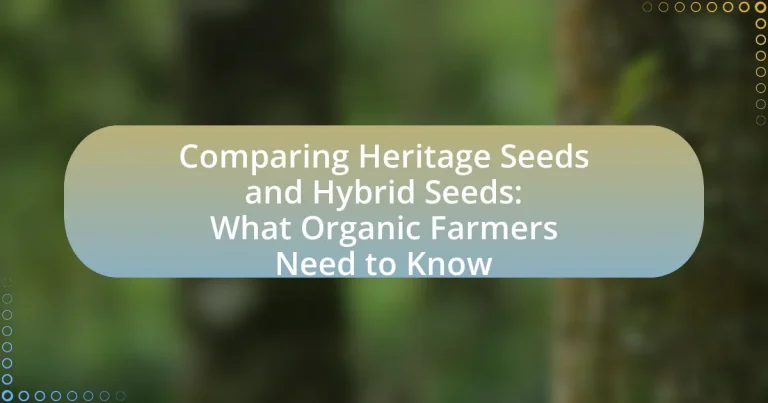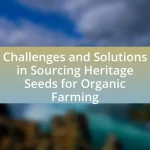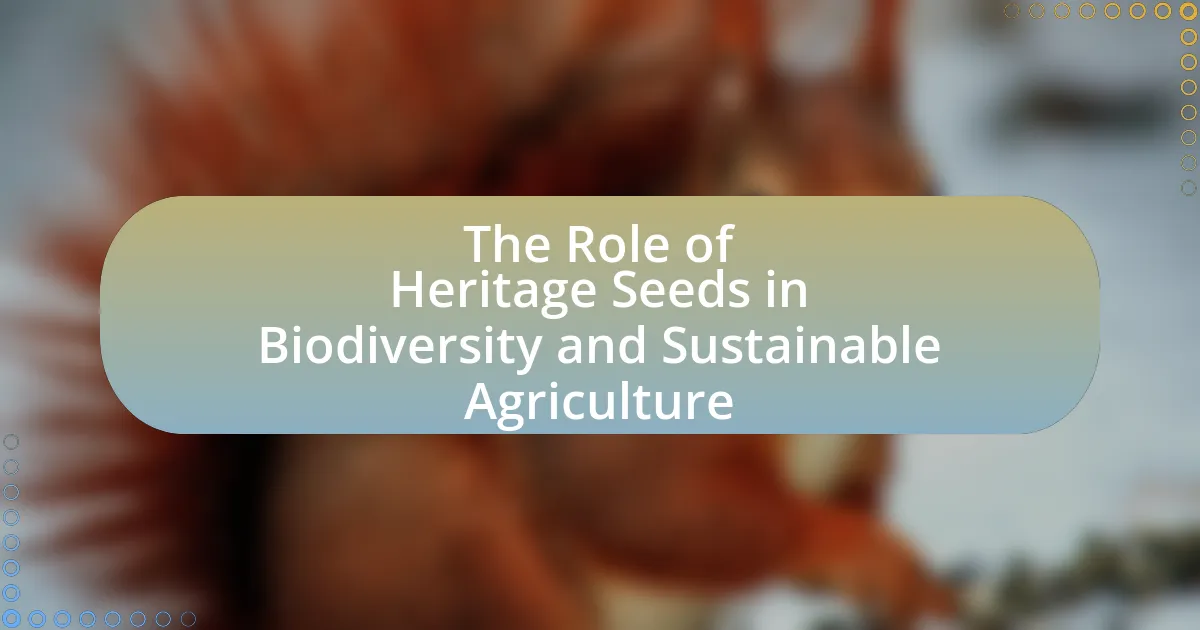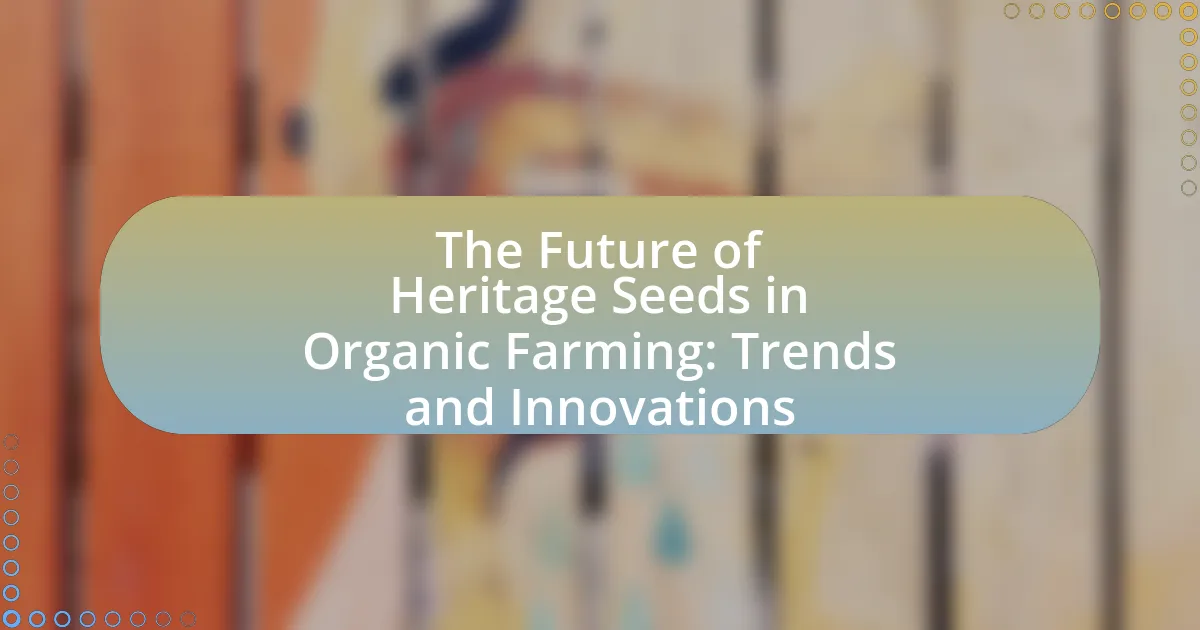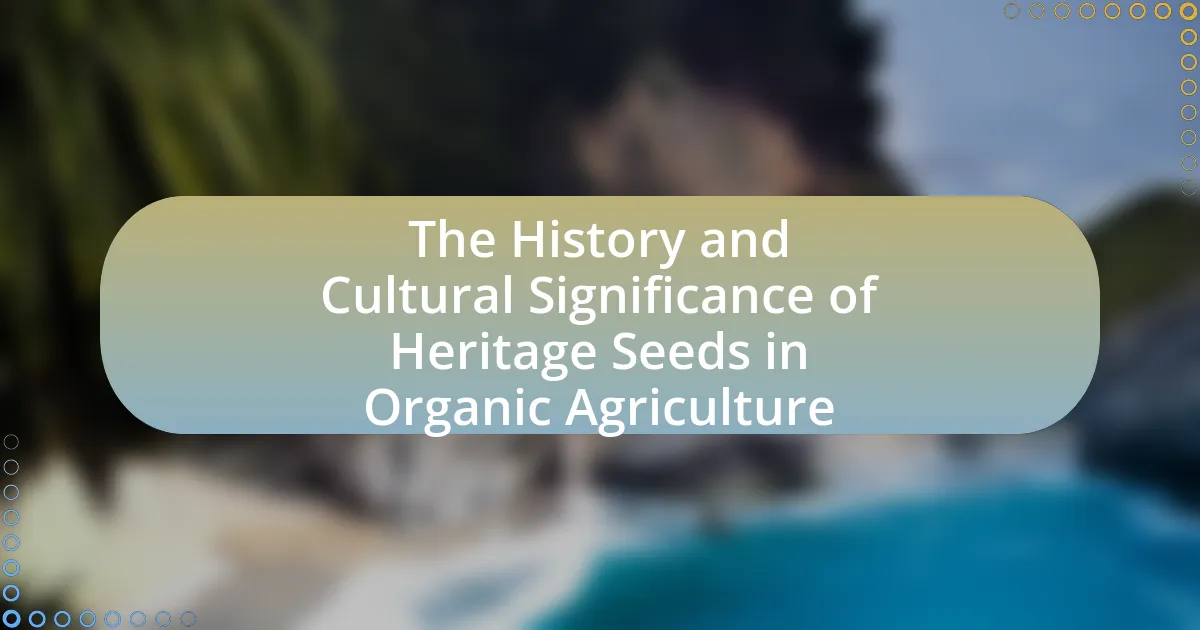Heritage seeds, also known as heirloom seeds, are open-pollinated varieties that have been cultivated for generations, valued for their genetic diversity and unique traits. In contrast, hybrid seeds are produced through controlled cross-pollination to achieve specific characteristics such as higher yields and disease resistance. This article compares the two types of seeds, highlighting their differences in breeding methods, advantages, and disadvantages, particularly in the context of organic farming. It discusses the importance of heritage seeds for biodiversity, soil health, and economic benefits, while also addressing the challenges organic farmers face with both seed types. Additionally, it provides guidance on selecting seeds based on climate, soil conditions, and best practices for sustainable agriculture.

What are Heritage Seeds and Hybrid Seeds?
Heritage seeds, also known as heirloom seeds, are open-pollinated varieties that have been passed down through generations, often for at least 50 years, and are valued for their genetic diversity and unique traits. Hybrid seeds, on the other hand, are produced by cross-pollinating two different parent plants to create offspring with specific desired characteristics, such as higher yields or disease resistance. The distinction lies in their breeding methods: heritage seeds maintain traditional genetics, while hybrid seeds are engineered for specific agricultural outcomes.
How do Heritage Seeds differ from Hybrid Seeds?
Heritage seeds are open-pollinated varieties that have been passed down through generations, while hybrid seeds are created through controlled pollination between two different parent plants to produce specific traits. Heritage seeds maintain genetic diversity and can be saved and replanted by farmers, whereas hybrid seeds often do not produce offspring that retain the desired traits, requiring farmers to purchase new seeds each season. This distinction is crucial for organic farmers, as heritage seeds support sustainable practices and biodiversity, while hybrid seeds are typically bred for uniformity and higher yields.
What characteristics define Heritage Seeds?
Heritage seeds are defined by their open-pollinated nature, which allows them to be naturally pollinated by wind, insects, or other natural means. These seeds are typically heirloom varieties that have been passed down through generations, often exhibiting traits such as adaptability to local growing conditions, unique flavors, and resistance to pests and diseases. Heritage seeds are also known for their genetic diversity, which contributes to the resilience of crops in varying environmental conditions. This diversity is crucial for sustainable agriculture, as it helps maintain ecosystem balance and supports biodiversity.
What characteristics define Hybrid Seeds?
Hybrid seeds are characterized by their genetic composition, resulting from the crossbreeding of two different parent plants to produce offspring with specific desirable traits. These traits often include increased yield, uniformity in size and growth, resistance to pests and diseases, and adaptability to various environmental conditions. For instance, hybrid corn varieties can yield 20-30% more than traditional varieties due to these enhanced characteristics. Additionally, hybrid seeds typically exhibit hybrid vigor, or heterosis, which leads to improved growth rates and overall plant health compared to their parent strains.
Why are Heritage Seeds important for organic farming?
Heritage seeds are important for organic farming because they promote biodiversity and resilience in agricultural systems. These seeds are open-pollinated and have been passed down through generations, allowing farmers to save seeds and maintain genetic diversity. This genetic diversity is crucial for adapting to changing environmental conditions and pests, which is essential for sustainable farming practices. Studies show that heritage varieties often have better flavor and nutritional value compared to hybrids, making them more desirable for organic markets. Additionally, using heritage seeds supports local ecosystems and preserves agricultural heritage, contributing to the overall sustainability of organic farming.
What historical significance do Heritage Seeds hold?
Heritage seeds hold historical significance as they represent traditional plant varieties that have been cultivated for generations, often passed down through families and communities. These seeds are crucial for preserving biodiversity, as they maintain genetic diversity that is essential for food security and resilience against pests and diseases. For example, many heritage varieties were developed before the advent of modern agricultural practices and hybridization, making them vital for understanding agricultural history and practices. Additionally, heritage seeds often have unique flavors and characteristics that reflect the cultural heritage of the regions they originate from, thus contributing to culinary diversity.
How do Heritage Seeds contribute to biodiversity?
Heritage seeds contribute to biodiversity by preserving a wide variety of plant genetic resources that are adapted to local environments. These seeds represent traditional agricultural practices and genetic diversity, which are crucial for ecosystem resilience and food security. According to the Food and Agriculture Organization, heritage seeds can enhance biodiversity by maintaining unique traits that may be lost in commercial hybrid varieties, thus supporting a diverse range of crops that can withstand pests, diseases, and climate change.

What are the advantages and disadvantages of Heritage Seeds?
Heritage seeds offer several advantages and disadvantages. The primary advantage is their genetic diversity, which enhances resilience to pests and diseases, as evidenced by studies showing that diverse crops can better withstand environmental stresses. Additionally, heritage seeds are often open-pollinated, allowing farmers to save seeds for future planting, thus promoting sustainability and self-sufficiency. However, a notable disadvantage is that heritage seeds may yield less than hybrid varieties, which are bred for higher productivity. Furthermore, heritage seeds can be more susceptible to certain diseases, requiring careful management and knowledge of local growing conditions.
What benefits do Heritage Seeds offer to organic farmers?
Heritage seeds offer organic farmers several benefits, including genetic diversity, adaptability to local conditions, and the ability to save seeds for future planting. Genetic diversity in heritage seeds enhances resilience against pests and diseases, which is crucial for sustainable farming practices. Additionally, these seeds are often well-suited to specific regional climates and soils, allowing for better crop yields. The ability to save seeds from heritage varieties promotes self-sufficiency and reduces dependency on commercial seed suppliers, aligning with organic farming principles.
How do Heritage Seeds enhance soil health?
Heritage seeds enhance soil health by promoting biodiversity and improving soil structure. These seeds are often adapted to local conditions, which allows them to thrive without the need for synthetic fertilizers or pesticides, thereby reducing chemical runoff and soil degradation. Research indicates that crops grown from heritage seeds can contribute to increased organic matter in the soil, which enhances nutrient retention and microbial activity. For example, a study published in the journal “Agriculture, Ecosystems & Environment” found that diverse cropping systems, including those utilizing heritage seeds, can lead to improved soil health indicators such as increased soil organic carbon and enhanced microbial diversity.
What are the economic advantages of using Heritage Seeds?
Heritage seeds provide significant economic advantages, primarily through cost savings and market differentiation. By using heritage seeds, farmers can save money on seed purchases, as these seeds can be saved and replanted year after year, reducing the need for annual seed purchases. Additionally, heritage seeds often yield crops that are more resilient to local conditions, potentially leading to lower input costs for fertilizers and pesticides.
Furthermore, crops grown from heritage seeds can command higher prices in niche markets due to their unique flavors and historical significance, enhancing profitability. For instance, a study by the University of California found that heirloom tomatoes, a type of heritage seed, can sell for up to three times the price of conventional varieties, illustrating the potential for increased revenue. Thus, the economic advantages of using heritage seeds include reduced costs, increased resilience, and the ability to tap into premium markets.
What challenges do organic farmers face with Heritage Seeds?
Organic farmers face several challenges with Heritage Seeds, primarily related to seed availability, disease resistance, and yield consistency. Heritage Seeds often have limited commercial availability, making it difficult for farmers to source the specific varieties they need. Additionally, these seeds may lack the disease resistance found in hybrid varieties, leading to increased vulnerability to pests and diseases. Furthermore, Heritage Seeds can exhibit variability in yield, which poses a risk for farmers relying on consistent production for economic stability. These challenges are significant as they impact the overall productivity and sustainability of organic farming practices.
How do pests and diseases affect Heritage Seeds?
Pests and diseases significantly impact Heritage Seeds by reducing their yield and quality. Heritage Seeds, which are open-pollinated and often less genetically uniform than hybrids, can be more susceptible to specific pests and diseases, leading to crop losses. For instance, studies have shown that certain fungal diseases, like powdery mildew, can devastate Heritage varieties, resulting in a decrease in both the quantity and nutritional value of the harvest. Additionally, pests such as aphids can transmit viruses that further compromise the health of these plants. The vulnerability of Heritage Seeds to these threats underscores the importance of integrated pest management and disease-resistant varieties in organic farming practices.
What are the limitations in seed availability for Heritage Seeds?
Heritage seeds face significant limitations in seed availability primarily due to their lower commercial production compared to hybrid seeds. This reduced availability stems from the fact that heritage seeds are often produced by smaller, independent growers who focus on maintaining genetic diversity rather than mass production. Additionally, many heritage varieties are not as widely marketed or distributed, leading to limited access for farmers. According to the Seed Savers Exchange, a non-profit organization dedicated to preserving heirloom seeds, many heritage varieties are at risk of extinction due to declining cultivation and market demand, further exacerbating the issue of seed availability.

What are the advantages and disadvantages of Hybrid Seeds?
Hybrid seeds offer several advantages and disadvantages. The primary advantage of hybrid seeds is their higher yield potential, which can be attributed to selective breeding that enhances desirable traits such as disease resistance and adaptability to various environmental conditions. For instance, hybrid corn varieties can produce 20-30% more grain than traditional varieties, according to the USDA.
Conversely, a significant disadvantage of hybrid seeds is that they often require purchasing new seeds each planting season, as they do not produce seeds that are true to type. This can lead to increased costs for farmers over time. Additionally, hybrid seeds may have reduced genetic diversity, making crops more susceptible to pests and diseases, as noted in research published by the International Journal of Agricultural Sustainability.
What benefits do Hybrid Seeds provide for organic farming?
Hybrid seeds provide several benefits for organic farming, including improved yield, disease resistance, and adaptability to various environmental conditions. These seeds are specifically bred to enhance traits such as growth rate and productivity, which can lead to higher harvests compared to traditional varieties. For instance, studies have shown that hybrid corn can yield 20-30% more than open-pollinated varieties under similar conditions. Additionally, hybrid seeds often exhibit greater resistance to pests and diseases, reducing the need for chemical interventions, which aligns with organic farming principles. This combination of higher yields and reduced pest pressure makes hybrid seeds a valuable option for organic farmers seeking to maximize their productivity sustainably.
How do Hybrid Seeds improve yield and productivity?
Hybrid seeds improve yield and productivity by combining the best traits of two parent plants, resulting in offspring that exhibit enhanced growth characteristics. These seeds often demonstrate increased resistance to pests and diseases, improved drought tolerance, and higher nutrient efficiency, which collectively contribute to greater crop yields. For instance, studies have shown that hybrid corn varieties can yield 20-30% more than traditional varieties under similar conditions, highlighting their effectiveness in maximizing agricultural output.
What are the advantages of disease resistance in Hybrid Seeds?
Disease resistance in hybrid seeds offers significant advantages, primarily by reducing crop losses and minimizing the need for chemical interventions. This resistance leads to healthier plants that can withstand various pathogens, resulting in higher yields. For instance, studies have shown that hybrid varieties can exhibit up to 30% greater resistance to diseases compared to traditional varieties, which directly correlates to increased profitability for farmers. Additionally, disease-resistant hybrids can contribute to sustainable farming practices by lowering pesticide usage, thus promoting environmental health.
What are the drawbacks of using Hybrid Seeds?
The drawbacks of using hybrid seeds include reduced genetic diversity, dependency on seed companies, and potential loss of traditional farming practices. Hybrid seeds are often bred for specific traits, which can lead to a narrow genetic base, making crops more susceptible to diseases and pests. Additionally, farmers may become reliant on purchasing new seeds each season from commercial suppliers, as hybrid seeds typically do not produce viable seeds for replanting. This reliance can undermine traditional agricultural practices and local seed saving.
How do Hybrid Seeds impact genetic diversity?
Hybrid seeds reduce genetic diversity in agricultural systems. This occurs because hybridization often involves crossing a limited number of parent lines, leading to a narrower genetic base compared to open-pollinated or heritage seeds, which maintain a broader genetic pool. Studies indicate that reliance on hybrid seeds can result in monocultures, making crops more susceptible to diseases and pests due to the lack of genetic variation. For instance, the Green Revolution, which promoted hybrid varieties, significantly increased yields but also led to a decline in traditional varieties, thereby diminishing overall genetic diversity in many regions.
What are the implications of seed saving with Hybrid Seeds?
Seed saving with hybrid seeds generally leads to inconsistent plant characteristics in subsequent generations. Hybrid seeds are specifically bred for certain traits, and when saved and replanted, they do not reliably produce plants that exhibit the same desirable traits as the parent generation. This is due to the genetic variability introduced during the hybridization process, which can result in a range of outcomes that may not meet the expectations of the grower. For instance, a study by the University of California found that hybrid corn seeds, when saved and replanted, can yield plants that vary significantly in size, disease resistance, and productivity compared to the original hybrid. Therefore, the implications of seed saving with hybrid seeds include potential loss of desired traits, reduced yield consistency, and increased uncertainty in crop performance.
How can organic farmers choose between Heritage and Hybrid Seeds?
Organic farmers can choose between Heritage and Hybrid Seeds by evaluating their specific agricultural goals and the growing conditions of their farms. Heritage seeds, which are open-pollinated and often have a rich genetic diversity, are suitable for farmers seeking to preserve traditional varieties and promote biodiversity. In contrast, hybrid seeds are bred for specific traits such as higher yields or disease resistance, making them ideal for farmers focused on maximizing production efficiency. Research indicates that heritage varieties can adapt better to local conditions over time, while hybrids may offer more consistent performance in controlled environments. Therefore, the choice hinges on whether the farmer prioritizes sustainability and biodiversity or yield and uniformity.
What factors should be considered when selecting seeds for organic farming?
When selecting seeds for organic farming, factors such as seed variety, disease resistance, adaptability to local conditions, and certification status must be considered. Seed variety influences yield and flavor, while disease resistance is crucial for minimizing crop loss. Adaptability ensures that the seeds thrive in the specific climate and soil conditions of the farm, which can vary significantly across regions. Certification status confirms that the seeds meet organic standards, ensuring compliance with regulations and consumer expectations. These considerations are essential for successful organic farming practices.
How do climate and soil conditions influence seed selection?
Climate and soil conditions significantly influence seed selection by determining which plant varieties can thrive in specific environments. For instance, temperature, precipitation, and humidity levels dictate the growth patterns and survival rates of different seeds. Soil characteristics, such as pH, nutrient content, and texture, further affect seed germination and plant health. Research indicates that crops like corn require warm temperatures and well-drained soils, while others, such as barley, can tolerate cooler climates and poorer soils. Therefore, understanding local climate and soil conditions is essential for farmers to choose the most suitable seed varieties, ensuring optimal yield and sustainability.
What best practices should organic farmers follow when using Heritage and Hybrid Seeds?
Organic farmers should prioritize seed selection based on their specific growing conditions and desired crop characteristics when using Heritage and Hybrid Seeds. Heritage seeds, known for their adaptability and genetic diversity, should be chosen for their resilience and ability to thrive in local environments. Farmers should also ensure that hybrid seeds are sourced from reputable suppliers to guarantee quality and performance.
Additionally, organic farmers must adhere to organic certification standards, which often restrict the use of certain hybrid seeds that do not meet organic criteria. Crop rotation and diversity should be practiced to maintain soil health and reduce pest pressures, benefiting both heritage and hybrid varieties.
Research indicates that using a mix of heritage and hybrid seeds can enhance biodiversity and improve overall farm resilience, as supported by studies from the Organic Farming Research Foundation. By following these best practices, organic farmers can optimize their yields while maintaining sustainable farming practices.
